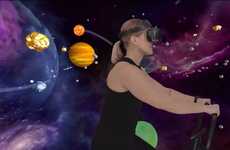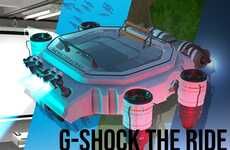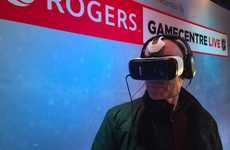
Interactive Lab Sets Virtual Reality in Motion with an Electric Trike
Laura McQuarrie — August 17, 2016 — Autos
References: interactivelab.ru & youtube
In order to enhance the kinds of experiences that people can have in immersive virtual reality worlds, Russia-based Interactive Labs created a unique sensor-connected cycling experience. People are able to hop onto a physical electric trike in the real world and at the same time, be led through a colorful race track as if on a virtual cycle.
Interactive Labs recently showcased this cutting-edge experience at VRLA. This kind of technology is indicative of the future of virtual reality technology, which seems to be moving in a direction that involves the use of external props in order to make the simulated worlds seem more realistic and engaging.
As well as being purely novel, this kind of VR technology has applications for everything from video gaming to automotive marketing.
Interactive Labs recently showcased this cutting-edge experience at VRLA. This kind of technology is indicative of the future of virtual reality technology, which seems to be moving in a direction that involves the use of external props in order to make the simulated worlds seem more realistic and engaging.
As well as being purely novel, this kind of VR technology has applications for everything from video gaming to automotive marketing.
Trend Themes
1. Sensor-connected Cycling Experiences - Disruptive innovation opportunities include creating immersive and interactive virtual reality experiences by incorporating physical props and enhancing realism.
2. Immersive Virtual Reality Technology - Disruptive innovation opportunities lie in developing virtual reality applications that utilize external props to create more engaging and realistic virtual worlds.
3. Virtual Reality in Automotive Marketing - Disruptive innovation opportunities can be found in using virtual reality to enhance automotive marketing experiences, such as allowing customers to virtually test drive vehicles using physical simulation props.
Industry Implications
1. Virtual Reality Technology - The virtual reality industry can leverage sensor-connected cycling experiences to create more immersive and interactive VR applications.
2. Gaming - The gaming industry can incorporate sensor-connected cycling experiences into virtual reality games to provide players with a more realistic and engaging gameplay.
3. Automotive Marketing - The automotive marketing industry can adopt virtual reality technology to create virtual test driving experiences that utilize physical simulation props, enhancing the customer's engagement and decision-making process.
4.1
Score
Popularity
Activity
Freshness















